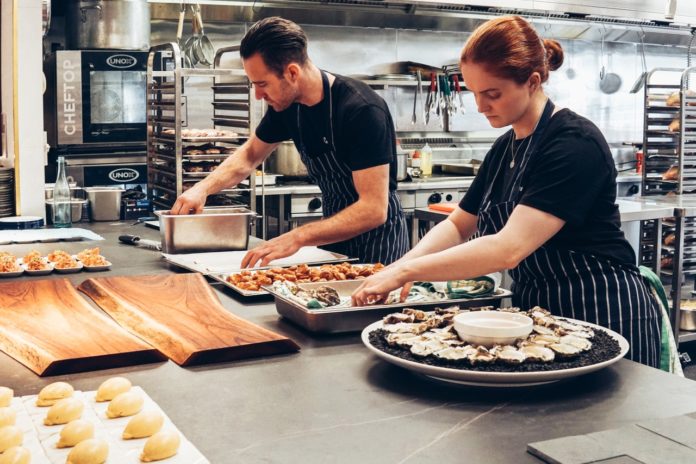Caterers are the first and foremost requirement of every event despite its type, be it celebration or burial. Catering has two basic types, on-premises, and off-premises catering. Both of them come with their unique challenges, where the later is more demanding because there is no kitchen facility at the serving location. Despite the types of catering, average capacity production of 500 people can translate into excellent margins due to volume and scale. You can do everything right, but in the business of catering, if the taste and quality of the food are sub-par, you’re not going to get very far.
Continuing with the types of catering and caterers, people more often prefer home-based caterers who run their businesses either part-time or full time. Aspiring entrepreneurs and people with skills are so much into this profession due to its extensive options and growth chances. The reason is that every catering company focus on its specialty. The most significant catering events involving many services are weddings, birthday celebrations, and even funeral ceremonies. Each catering business, whether small or large, can be demanding because too many orders can arrive all at the same time, putting pressure on limited resources.
Market Analysis of Catering Business
Market analysis for a catering business company is critical, whether it is home-based or not. For a home-based caterer, having a distinct identity in the market becomes easier if certain factors are present. First, the product (menu) has a large variety and is reasonably priced. Direct marketing through public relations makes it easier for home-based caterers. Because you can achieve popularity among other catering companies. As it is easy to enter into this business, you’ll always be competing with other companies for the same market. If you take the competition seriously, then a growing number of competitors doesn’t matter.
On the other hand, you can highlight your distinguishing features. Your job is to ensure that you offer excellent service to customers. Foodservice includes duties such as cleaning, supervisory, hospitality & catering jobs, preparing the bills jobs, serving food jobs, and taking orders jobs. You will enjoy this job if you can work in a fast-moving environment and you are good at multitasking.
STEPS TO START A HOME-BASED CATERING BUSINESS
Below are the steps for an aspiring caterer to start their own business and achieve their dreams. Catering can be part-time or full-time business according to one’s availability, finances, and equipment on hand.
1. Fulfilling the Basic Requirements
Catering business despite its uniqueness cannot be started without planning. The market, although it is enormous and growing but not blind. All of a sudden, a caterer cannot get success unless he has a proper plan for their business. Including the type of catering and services, one wants to offer. The catering business, just like the others, demands time management, presentation skills, attractive deals, promotion, and a variety of food items.
Therefore, firstly home-based caterer needs to do a lot of research on what the competitors are offering at what price. The skill of caterer in making mouth-watering cuisine can invite a lot of customers. The best way to test your ability to cook is to let others taste your preparations like your family, friends, relatives, etc. Once the test is successful, setting up the kitchen and having proper pieces of equipment. For example, offering cakes without having suitable cooking ranges and baking ovens will not work.
2. Spacing
Finding a proper space is the other most crucial step to starting up a catering business from home. Home-based catering also needs space for the storage of not just cooked dishes but the extra ingredients required. The additional elements are there to avoid any timely hassles.
3. Delivery
Production, along with the delivery, creates more demand for the business. For a caterer running a home-based business, having a delivery service available for his customers is very much encouraged. Many caterers that only offers food with no delivery is not commonly approached by the customers, even if the taste is unique. The reason is the long-distance, occupied routine (especially if the catering is of an event) and sometimes. The unavailability of the personal transportation of the customer. That is yet the taste, unique menu, hygienic conditions, and the variety that keeps a food lover ordering as much. As he can to keep his taste buds updated. A food delivery van/ scooter/ bicycle with a storage box equipped with foil sheets to keep the food at the right temperature and avoid it from getting cold is essential.
4. Legalities
Catering businesses require some legal and paperwork to be done on time so that no illegality comes under the way. Home-based catering will need state, city, and area permits to run the business. That will grant permission after checking hygienic conditions, spacing, and the budget allotted to the company. The ingredients and recipes are also verified to avoid any health issues in public and to ensure expiry dates. There are some quality standards specified by the law that are must cross-checked. The physical existence or at least the zoned area and brand is required for the authorities to check to ensure the identity. Health permits are the other need and attractions a caterer can offer to his customers. Health permits are issued after reviewing kitchen, cleanliness, food storage conditions, waste handling management, etc.
5. Partnerships
Partnering in business, not for sharing, but promoting each other and having a win-win game is quite an intelligent move. For a home-based caterer partnership with an event, the planner can be beneficial. As the contract to any of them can be helpful and provide a reference to the other as well. In that case, however, both will have to work for each other’s reputation. The partnership is one of the essential steps that a home-based caterer must take wisely to start his business.
6. Insurance
Insurance in the business is the savings that a man can opt for in times of crisis. Any form of serious health-related issues, damage to equipment and liabilities, loss of business. Leading to the defaulting situation, insurance can be a savior to cover the financial difficulties. Getting insurance done is sometimes is included among the legal requirement as well.
Conclusion
Preparing food and serving it in a fancy way is an art. A home-based caterer would need the six steps, as discussed above, to help them in starting their own business. However, to help you meet the challenges ahead, do consider a partner. Who can support you both during the starting and running phases of your new business.


















